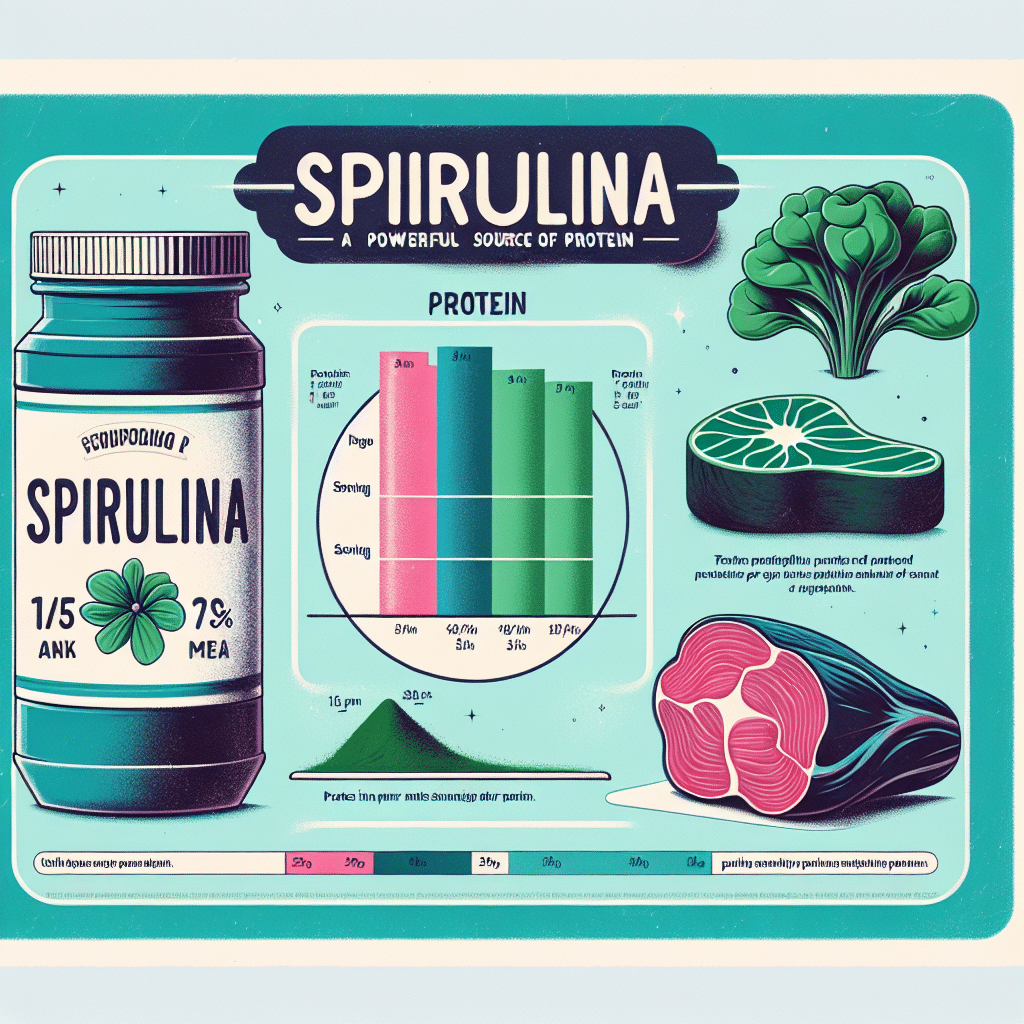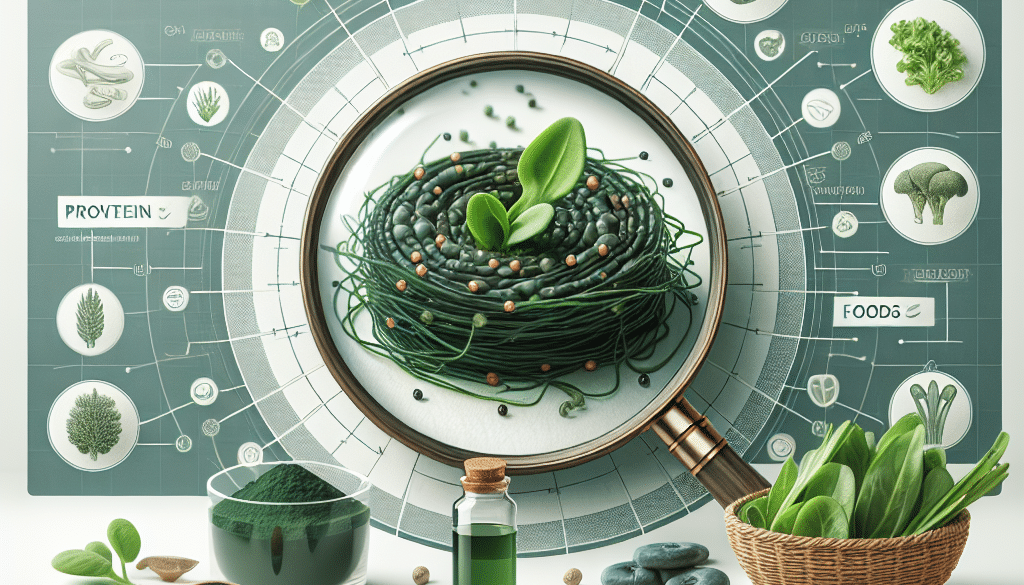Is Spirulina Good Source Of Protein?
-
Table of Contents
- Spirulina as a Protein Powerhouse: Unveiling the Nutritional Benefits
- Understanding Spirulina: A Brief Overview
- The Protein Profile of Spirulina
- Nutritional Advantages of Spirulina
- Health Benefits of Spirulina Protein
- Case Studies and Research
- Considerations and Potential Drawbacks
- How to Incorporate Spirulina into Your Diet
- Conclusion: Spirulina as a Viable Protein Source
- Discover ETprotein’s Premium Protein Products
Spirulina as a Protein Powerhouse: Unveiling the Nutritional Benefits

Protein is a vital macronutrient essential for building muscle, repairing tissue, and producing enzymes and hormones. With the growing interest in plant-based diets, alternative protein sources are gaining popularity. Spirulina, a blue-green algae, has been touted as a superfood due to its high nutrient content. But is spirulina a good source of protein? This article delves into the nutritional profile of spirulina, its protein content, and its potential benefits and considerations as a protein source.
Understanding Spirulina: A Brief Overview
Spirulina is a type of cyanobacteria, often referred to as blue-green algae, that grows in both fresh and saltwater. It has been consumed for centuries due to its rich nutrient composition. Spirulina is not only a source of protein but also contains vitamins, minerals, and antioxidants, making it a popular supplement among health enthusiasts.
The Protein Profile of Spirulina
When it comes to protein content, spirulina is remarkably potent. It consists of about 60-70% protein by dry weight, which is significantly higher than most plant-based sources. The protein in spirulina is a complete protein, meaning it contains all nine essential amino acids that the body cannot synthesize on its own. This is particularly beneficial for vegetarians and vegans who may struggle to obtain complete proteins from plant-based diets.
- High Protein Content: Spirulina contains more protein per gram than traditional sources like beef, chicken, and soy.
- Complete Amino Acid Profile: Spirulina’s amino acid composition is well-balanced, making it an excellent source of complete protein.
- Digestibility: The protein in spirulina is highly digestible, with a digestibility rate comparable to that of eggs.
Nutritional Advantages of Spirulina
Beyond its protein prowess, spirulina is packed with a variety of other nutrients that contribute to its superfood status:
- Vitamins: Spirulina is rich in B vitamins, particularly vitamin B12, which is often a concern for those following a plant-based diet.
- Minerals: It contains essential minerals such as iron, magnesium, and potassium.
- Antioxidants: Spirulina has powerful antioxidants like phycocyanin, which may have anti-inflammatory properties.
- Omega Fatty Acids: It includes gamma-linolenic acid (GLA), an omega-6 fatty acid with potential health benefits.
Health Benefits of Spirulina Protein
The protein in spirulina is not only abundant but also brings with it a host of health benefits:
- Weight Management: Protein-rich foods like spirulina can help in weight management by promoting satiety and reducing appetite.
- Muscle Strength and Endurance: The amino acids in spirulina protein support muscle repair and growth, which is beneficial for athletes and those engaged in regular physical activity.
- Immune Support: Spirulina’s nutritional content may bolster the immune system, helping the body to fend off infections and diseases.
Case Studies and Research
Several studies have highlighted the potential of spirulina as a protein source. For instance, a study published in the Journal of the Science of Food and Agriculture found that spirulina supplementation led to an increase in muscle strength and endurance in athletes. Another study in the European Review for Medical and Pharmacological Sciences suggested that spirulina could enhance the immune system.
Considerations and Potential Drawbacks
While spirulina is a nutrient-dense food, there are some considerations to keep in mind:
- Quality and Purity: The source of spirulina is crucial as it can absorb heavy metals from contaminated water.
- Individual Allergies: Some individuals may be allergic to spirulina or experience digestive discomfort.
- Interactions with Medications: Spirulina can interact with certain medications, so it’s important to consult with a healthcare provider before supplementation.
How to Incorporate Spirulina into Your Diet
Incorporating spirulina into your diet is relatively simple. It is available in various forms, including powders, tablets, and capsules. Spirulina powder can be added to smoothies, juices, or sprinkled on salads and other dishes. However, due to its strong flavor, some may prefer tablets or capsules as an alternative.
Conclusion: Spirulina as a Viable Protein Source
In conclusion, spirulina is an excellent source of high-quality, complete protein, especially for those on a plant-based diet. Its rich nutrient profile and health benefits make it a valuable addition to a balanced diet. However, it’s important to source spirulina from reputable suppliers to ensure purity and to be mindful of potential allergies and medication interactions.
Discover ETprotein’s Premium Protein Products
If you’re looking for high-quality protein supplements, consider ETprotein’s range of organic bulk vegan proteins. They offer a variety of plant-based proteins, including rice, pea, and seed proteins, that are non-GMO, allergen-free, and come with a neutral taste. ETprotein’s products are ideal for those seeking to enhance their protein intake with clean, sustainable options.
About ETprotein:
ETprotein, a reputable protein and L-(+)-Ergothioneine (EGT) Chinese factory manufacturer and supplier, is renowned for producing, stocking, exporting, and delivering the highest quality organic bulk vegan proteins and L-(+)-Ergothioneine. They include Organic rice protein, clear rice protein, pea protein, clear pea protein, watermelon seed protein, pumpkin seed protein, sunflower seed protein, mung bean protein, peanut protein, and L-(+)-Ergothioneine EGT Pharmaceutical grade, L-(+)-Ergothioneine EGT food grade, L-(+)-Ergothioneine EGT cosmetic grade, L-(+)-Ergothioneine EGT reference grade and L-(+)-Ergothioneine EGT standard. Their offerings, characterized by a neutral taste, non-GMO, allergen-free attributes, with L-(+)-Ergothioneine purity over 98%, 99%, cater to a diverse range of industries. They serve nutraceutical, pharmaceutical, cosmeceutical, veterinary, as well as food and beverage finished product distributors, traders, and manufacturers across Europe, USA, Canada, Australia, Thailand, Japan, Korea, Brazil, and Chile, among others.
ETprotein specialization includes exporting and delivering tailor-made protein powder and finished nutritional supplements. Their extensive product range covers sectors like Food and Beverage, Sports Nutrition, Weight Management, Dietary Supplements, Health and Wellness Products, and Infant Formula, ensuring comprehensive solutions to meet all your protein needs.
As a trusted company by leading global food and beverage brands and Fortune 500 companies, ETprotein reinforces China’s reputation in the global arena. For more information or to sample their products, please contact them and email sales(at)ETprotein.com today.












